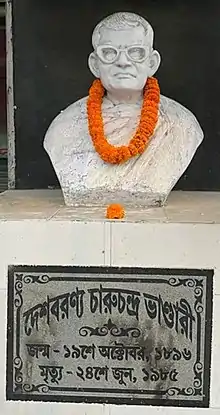Charu Chandra Bhandari
Charu Chandra Bhandari (19 October 1896 – 24 June 1985) was a staunch independence activist, Gandhian and Sarvodaya leader. He was the chief propagator of the Sarvodaya movement in Bengal as a close associate of Acharya Vinoba Bhave and took an active part in the Bhoodan movement.[1]
Charuchandra Bhandari | |
|---|---|
 A bust statue of Charuchandra Bhandari in Diamond Harbour municipality | |
| Born | 19 October 1896 |
| Died | 24 June 1985 (aged 88) |
| Occupation(s) | Lawyer, Independence activist, Politician |
| Spouse | Prabhanalini Bhandari |
Birth and early life
Charu Chandra Bhandari was born on 19 October, 1896 in Shyam Basur Chak village under Kulpi police station in Diamond Harbor subdivision of South Twenty-four Parganas, British India (present day West Bengal, India). He was a lawyer by profession.[2]
Activities
When the Salt Satyagraha movement started across the country in 1930, Charuchandra Bhandari led the movement in South Bengal and the Sundarbans under the instructions of Mahatma Gandhi . He left his profession of lawyer and completely joined the freedom struggle. Charuchandra was even caught by the police for participating in the salt satyagraha. After his release from jail, Khadi temples were built in various places of Sundarbans including Hatugunj, Diamond Harbour, Kulpi, Karanjali, Harinavi in South 24 Parganas. Freedom fighter Bishwaranjan Sen was one of his collaborators in the establishment of the Khadi Mandir in Diamond Harbour. Clothes by spinning wheels were manufactured here and were distributed in 24 Parganas and neighbouring districts for sale.[1][2]
Charuchandra was closely associated with the organizational and service work of Mahatma Gandhi's movement. He was also associated with the Abhay Ashram, which was inspired by Gandhian ideals and was founded in Comilla, Bengal (present-day Bangladesh).[3][2]
Charuchandra Bhandari was a notable disciple of Acharya Vinoba Bhave. Charuchandra was one of the main promoters of his Sarvodaya movement in West Bengal. According to him, co-operation is the basic principle of the village donation and land donation movement (Bhoodan movement). Charuchandra Bhandari tried his best to make the principles of Vinoba Bhave a reality. He along with many others took a life vow at the Sarvodaya conference held in Gaya. He founded the West Bengal Bhudajajna Mandal at Diamond Harbour.[2][4][5]
Charuchandra Bhandari was a member of the Bengal Legislative Assembly. [6] On June 20, 1947, he advocated for the establishment of West Bengal. In the first general election of independent India in 1951, Charuchandra Bhandari was elected from the Diamond Harbour Assembly constituency as a member of the Kisan Mazdoor Praja Party(KMPP). He became the first minister of food and civil supplies in Prafulla Chandra Ghosh's cabinet.[3][7]
Books written
- Bhūdānajajña ki ō kēna (1955)(What and Why Land donation movement)
- Āmādēra jātīẏa śikṣā (1962)(Our National Education)
- Kōra-āna sāra (Essence of Quran)
- Āsāmēra aśānti prasaṅgē (1961)
- Thoughts on Assam Disturbances (1961)[8]
Death and legacy
Charuchandra Bhandari passed away on June 24, 1985. After his death, the Charuchandra Memorial Committee was formed in his memory at Diamond Harbour. The 'Girls School Road' in ward number 13 of Diamond Harbour city has been named 'Charuchandra Bhandari Sarani' by the municipality and a bust statue of Charuchandra Bhandari has been installed at the intersection of Diamond Harbor Main Road and Charuchandra Bhandari Sarani.[3]
References
- Sengupta, Subodh (2016). Samsad Bangali Charitabhidhan (in Bengali). Kolkata: Sahitya Samsad. pp. 218, 267.
- সংবাদদাতা, নিজস্ব. "Charuchandra Bhandari: ধ্বংসের পথে স্বাধীনতা সংগ্রামী চারুচন্দ্রের খাদি মন্দির, সংস্কার চায় হটুগঞ্জ". www.anandabazar.com (in Bengali). Retrieved 14 July 2023.
- "এক সময়ের অর্থনীতির পীঠ স্থান আজ আগাছায় ভর্তি, উঠল সংস্কারের দাবি". News18 Bengali (in Bengali). 24 June 2023. Retrieved 14 July 2023.
- Sarkar, Bikram (1989). Land Reforms in India, Theory and Practice: A Study of Legal Aspects of Land Reforms Measures in West Bengal. APH Publishing. pp. 98, 102, 104. ISBN 978-81-7024-260-4.
- Narayan, Shriman; Vinobā (1970). Vinoba: His Life and Work. Popular Prakashan. p. 226. ISBN 978-81-7154-483-7.
- Sarkar, Bikram (1989). Land Reforms in India, Theory and Practice: A Study of Legal Aspects of Land Reforms Measures in West Bengal. APH Publishing. p. 49. ISBN 978-81-7024-260-4.
- Bandyopadhyay, Sekhar (3 June 2009). Decolonization in South Asia: Meanings of Freedom in Post-independence West Bengal, 1947–52. Routledge. pp. 19, 26, 83. ISBN 978-1-134-01824-6.
- Rajan, S. Irudaya (10 March 2022). The Routledge Handbook of Refugees in India. Taylor & Francis. ISBN 978-1-000-50976-2.